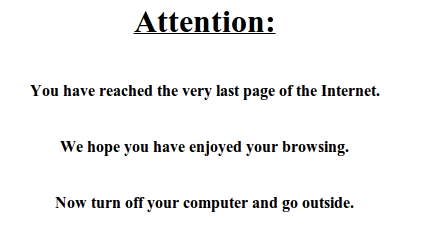I love television; probably too much. Last night Kathy and I were watching Mad Men, the best show being made right now. Each episode reveals a lot about the many characters and leaves you with a lot to think about, something I apparently wasn’t interested in doing: as soon as the episode was over I picked up the remote and clicked over to Reddit to watch the latest in cats and craziness from the internets. Having the Internet on your TV means there never needs to be silence, that there is always something else to watch.
Kathy pointed out I do this constantly, that I compusively ensure something follows the thing we watched last. Growing up with TV this feels natural: something always comes on next. But this is an Internet setup, and I have a choice. I routinely choose noise over reflection.
I’m thankful Kathy pointed this out. I spend a lot of my time on the Internet, because it’s my job but also because I love it. But it’s an infinite world, and if you don’t force yourself to stop from time to time you simply never will.
In the early days of the Internet one site claimed to be the end of it.

The joke, of course, was that the amount of content on the Internet could never be experienced by any one person. This was (somewhat) true at the time, but is indisputably true now–so much so that claiming there could be an end to the Internet almost seems quaint. Today user-generated sites like YouTube, Reddit and The Social Networks almost certainly add more content in a day than I could consume in a lifetime. We are presented with infinite choice, and we can pay attention to whatever we want.
And what you pay attention to matters. Your personality is defined in no small part by the sum of your experiences–the way your mother put you to bed as an infant, the games you and your siblings played together growing up, even the classes you took in college.
The act of observing affects the observer–that’s just human. Everything you experience and interact with shapes and molds that ball of fat in your skull you by some miracle experience as conciousness. If you’re at a hockey game, that experience shapes you. If you’re at a hockey game but only end up remembering the conversation you had with the person you came with, that shapes you in a different way. What you pay attention to matters, because it ends up defining in part who you are. It determines what or whom you care about.
When I go to a hockey game today I see plenty of people barely looking at the ice, engaged instead with their phones. Right in front of them are some of earth’s best athletes, engaged in competition for their benefit. They paid for the tickets, but instead are looking at their phone.
You and you alone decide what you pay attention to, and today there are more choices than ever before. Kathy wants my attention. She wants a conversation, to engage with me the culture we get to experience together. She wants shared experiences.
I’m glad we’re together, because sometimes I feel without her I’d drift into cyberspace and never manage to make it back to earth.

5 responses to “What you pay attention to matters”
[…] week: Justin wants you to know that what you pay attention to matters, because it ends up determining who you are. James and Dave discuss the things they’re paying […]
[…] pay more attention to their phones now than I could have imagined way back in 2006. What you pay attention to matters, however, so I”m going to ask again: are you having actual experiences? Or do you do things […]
[…] week: Justin wants we to know that what we compensate courtesy to matters, given it ends adult last who we are. James and Dave plead a things they’re profitable courtesy […]
[…] week: Justin wants you to know that what you pay attention to matters, because it ends up determining who you are. James and Dave discuss the things they’re paying […]
[…] week: Justin wants you to know that what you pay attention to matters, because it ends up determining who you are. James and Dave discuss the things they’re paying […]